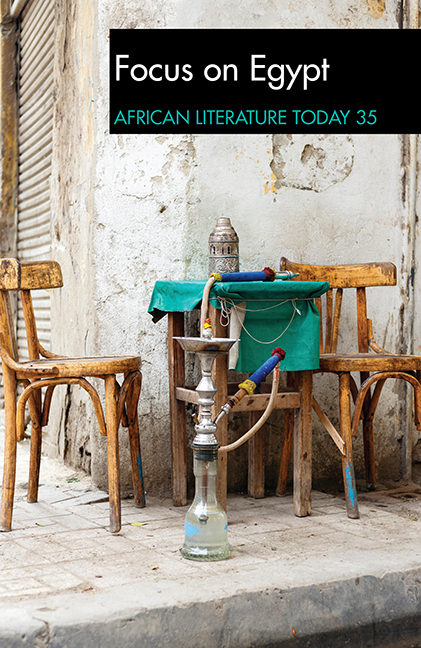Book contents
- Frontmatter
- Dedication
- Contents
- Notes on Contributors
- Foreword
- EDITORIAL ARTICLE
- ARTICLES
- Coping with a Failed Revolution: Basma Abdel Aziz, Nael Eltoukhy, Mohammed Rabie & Yasmine El Rashidi
- The Complications of Reading Egypt as Africa: Translation & Magdy el-Shafee's مترو (Metro)
- Narratives of the ‘Nubian Awakening’: Reclaiming Egypt's African Identity
- Frantz Fanon's Conceptualization of Decolonization in Sonallah Ibrahim's The Committee
- Romance as Epistemological Aesthetic in the Fiction of Ahdaf Soueif
- Literature as Prophecy: Re-Reading Yusuf Idris's The Cheapest Nights
- Travel & Discovery: Hopes for a New Egypt in Mohamed Salmawy's Butterfly Wings
- The Symbolic Relevance of the Use of the Eye in Nawal El Saadawi's Two Women in One & God Dies by the Nile
- African Epics: A Comparative Study of Sundiata & Al-Sirah al-Hilaliyyah
- Conversations with Nawal El Saadawi: Online interview
- FEATURED ARTICLES
- LITERARY SUPPLEMENT
- TRIBUTE
- REVIEWS
- Reviews of Nigerian Poetry
African Epics: A Comparative Study of Sundiata & Al-Sirahal-Hilaliyyah
from ARTICLES
Published online by Cambridge University Press: 24 August 2019
- Frontmatter
- Dedication
- Contents
- Notes on Contributors
- Foreword
- EDITORIAL ARTICLE
- ARTICLES
- Coping with a Failed Revolution: Basma Abdel Aziz, Nael Eltoukhy, Mohammed Rabie & Yasmine El Rashidi
- The Complications of Reading Egypt as Africa: Translation & Magdy el-Shafee's مترو (Metro)
- Narratives of the ‘Nubian Awakening’: Reclaiming Egypt's African Identity
- Frantz Fanon's Conceptualization of Decolonization in Sonallah Ibrahim's The Committee
- Romance as Epistemological Aesthetic in the Fiction of Ahdaf Soueif
- Literature as Prophecy: Re-Reading Yusuf Idris's The Cheapest Nights
- Travel & Discovery: Hopes for a New Egypt in Mohamed Salmawy's Butterfly Wings
- The Symbolic Relevance of the Use of the Eye in Nawal El Saadawi's Two Women in One & God Dies by the Nile
- African Epics: A Comparative Study of Sundiata & Al-Sirah al-Hilaliyyah
- Conversations with Nawal El Saadawi: Online interview
- FEATURED ARTICLES
- LITERARY SUPPLEMENT
- TRIBUTE
- REVIEWS
- Reviews of Nigerian Poetry
Summary
This articlefocuses on D.T. Niane's Sundiata: An Epic of OldMali and different narrations ofAl-Sirah al-Hilaliyyah in Egypt, toinvestigate the similarities and differences between them inrelation to the structure of the epic, represented by thestages through which the folk cultural hero passes: theprophecy, the birth of the hero, the alienation of the hero,and the final recognition of the hero. The article dependson the comparative method and the oral-formulaic theory(Finnegan Oral Poetry; Ong Oralityand Literacy).
It may besomewhat striking that the Arab folk conscience has so farkept on the oral narration of ‘Sirat Bani Hilal’; though itsnarration began as early as the tenth century. Thesirah is an Arabic folk art while theepic is a Western folk art. Although they differ in name,structure and content, they share a great deal of theirartistic characteristics. In his study of the relationshipbetween the Arabic sirah and the Westernepic, al-Hagagi has proved a high degree of similarity. Heeven considers the structure of the epic a part or a sectionof the folk sirah. Thesirah is the whole of which the epic isa part. The similarities even transcend the few existingdifferences of structure and text, blurring the differenceof language and locale (al-Hagagi Birth of a Hero inthe Folk Sirahs: 25-6). Among the importantsimilarities are focus on the topics of war, chivalry andmotivation for revenge. Linguistically speaking, the lexicalitem ‘epic’ is translated into Arabic as‘malhama’ which gives the meaning ofbodily engagement in the heat of battle, thus, denotingraging battle, but technically speaking it is a ‘longnarrative poem recounting great deeds and extraordinaryheroism’. Similarly, the ‘sirah’ is thebiography of a hero or a tribe including encounters, warsand fighting. Arabic dictionaries considermalhama and sirahsynonymous (al- Wageez Arabic Dictionary)in the tradition of the scholars that use the two termsinterchangeably. Scenes of battle are so numerous in boththat they can be seen as series of scenes of continuousbattles where these scenes and battles are greatly similar.The two genres are not set apart despite the radicaldifference between them. The epic tends to display conflictamong gods or demigods, sometimes with heroines that aregoddesses as well.
- Type
- Chapter
- Information
- ALT 35: Focus on EgyptAfrican Literature Today 35, pp. 132 - 151Publisher: Boydell & BrewerPrint publication year: 2017



